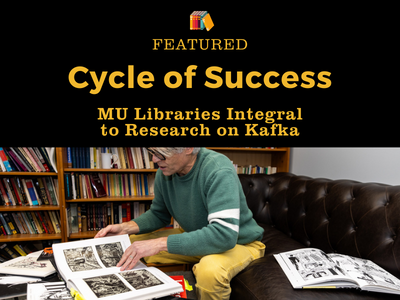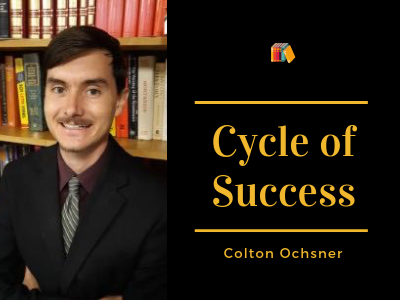Colton Ochsner, a history doctoral student at MU, does research on the origins of fantasy and science fiction films in modern German history. Colton chose the German cinema as his concentration because German films have become very influential. “They made a lot of movies that have spread across the world and influenced film, especially to America. Anything from Blade Runner to Star Wars has been inspired in some way by a lot of these older movies, especially visually. I have been drawn to these older movies in particular because I have known about the occult and I have seen it working in these movies and yet no scholar has pointed it out,” he said.
Knowing how specialized his research could be, Colton sought the help of Ellis librarians. “My research wouldn’t be possible without the librarians help because the books and movies from this era require Interlibrary Loan (ILL) to access them,” Colton said.
“The research Colton is doing on film and esoteric groups in Germany in the 1920s requires materials that are pretty sparse and many have not survived World War II and post-war disruptions,” said Anne Barker, humanities librarian. Anne is also fluent in German and how German libraries are structured, which makes it easier to fulfill Colton’s research requests. Anne helped Colton with deciphering references as he was trying to locate books and articles often with incomplete information. Anne said, “We’re so used to finding things online, it’s easy to forget that many things have not yet been digitized or indexed well.”
Since 2013, the ILL department processed more than 1,200 ILL requests for Colton. Oi-Chi (Ivy) Hui, head of ILL borrowing, works with Colton to fulfill the obscure requests. “It’s teamwork,” Ivy said. She has requested materials for Colton from Germany, France, Switzerland, Canada and throughout the United States. “Since these requests were not processed through the system, tracking correspondence manually and signing papers for copyright compliance is a challenge. Some of these materials took months before they got here,” Ivy said.
“The basic related teachings of the occult during this time-period that includes writings and images are important because in Germany people associated images, ideas and emotions with films,” Colton said. The research materials gave Colton the confirmation he needed. During his research, Colton found a poster from a 1919 film. While looking at the poster, he discovered the name of a book he had never heard. It turns out only two libraries in the world had the book. “It was a piece of pulp fiction literature from 1919. It was only published because it was going to be used to make an action and adventure movie,” he stated. Ivy was able to find the obscure book with the minimal information available and successfully filled the request.
With Anne and Ivy’s help, Colton continues to work on his research with a projected graduation date of 2023.
Cycle of Success is the idea that libraries, faculty, and students are linked; for one to truly succeed, we must all succeed. The path to success is formed by the connections between University of Missouri Libraries and faculty members, between faculty members and students, and between students and the libraries that serve them. More than just success, this is also a connection of mutual respect, support, and commitment to forward-thinking research.
If you would like to submit your own success story about how the libraries have helped your research and/or work, please use the Cycle of Success form.
Article written by Christina Mascarenas

